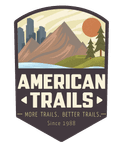This webinar will demonstrate ecotherapy ideas for attendees to implement in their own communities, on their own trails, and at different scales, and also show the importance of collaboration for community health.
This session will begin with an example ecotherapy exercise to demonstrate the impacts of nature on mental health. Participants will be asked to imagine a natural space that serves as their refuge in times of stress, and list how that space supports them.
After that introductory exercise and a brief overview of the speaker and related work, we will dive into what ecotherapy/nature mindfulness is and why it’s important.
This section will include:
- Brief history of ecotherapy and its main theories
- Summary of research on the physical and mental impacts of nature exposure
- Examples of ecotherapy activities that can be done on trails
- Why ecotherapy is important from an accessibility/scalability perspective, as well as equity considerations for implementation
- Why ecotherapy is vital for addressing climate grief and anxiety and inspiring community action In addition to this background on ecotherapy and mental health, we’ll briefly cover the connection between ecotherapy and public health in terms of reducing social isolation and creating cohesive, active communities.
The presenter offers two examples from their own work and will discuss the development of Ecotherapy Trails and a Campus Ecotherapy Guide at Butler University, and the new Mindful Nature Walks program with Indy Community Yoga, both in Indianapolis. These pilot projects can demonstrate ideas for audience members to implement in their own communities, on their own trails, and at different scales, and also show the importance of collaboration for community health. Lastly, they’ll discuss how cross-sector partnerships can accelerate ecotherapy projects, such as between institutions, individuals, advocacy groups, and other stakeholders, using the two previously mentioned projects as examples. The presenter will suggest strategies for success in project collaboration before we end with Q & A.
Trail uses: nonmotorized. Relevant to: natural and paved surfaces.
Learning Objectives:
- Attendees will be able to describe ecotherapy and nature-based stress reduction, its history and relevance, and potential activities
- Attendees will understand the benefits of cross-disciplinary collaboration to support mental health and wellbeing in their communities, especially in relation to trails and recreation spaces
- Attendees will learn about potential tools and programs to replicate ecotherapy or place-based supports for wellbeing in their own communities and on their own trails!
Trail Competencies
-
Relevant Trail Types
General. All trail types are relevant.
Learning Credits and CEUs

Learning credits will be available to attendees and are included in the registration fee. The length of the session will determine the number of hours/credits given. In order to obtain credits, attendees must fill out an evaluation survey for each session they attend, as well as complete a learning credit tracking form noting each session they are requesting credits for (or a quiz if virtual). This form (and complete instructions) will be available online as well at registration. Email the conference host or [email protected] with any questions.
American Trails is a certified provider and can offer the following learning credits and continuing education opportunities: AICP CM, LA CES (most HSW approved), NRPA CEU Equivalency Petition, and CEU/PDH Equivalency Petition for other accepting organizations.
You may also like
Related Upcoming Trainings
This training has been viewed 791 times.
